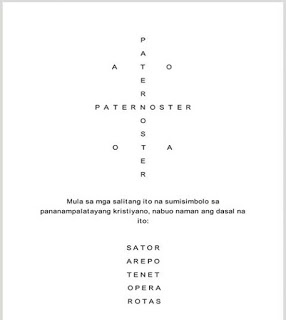Personally, I am not convinced that the fact that the letters "can" be formed into words and orders to make a cross surrounded by A & O for Alpha & Omega (first and last letters of Greek alphabet) is strong evidence for a Christian presence in Pompei.rakovsky wrote: ↑Sun Mar 18, 2018 7:38 amMy guess is that it was Christian, and I find numerous pieces of evidence for this like the picture above, but the evidence is circumstantial.
Romans of the time liked to play with anagrams and such puzzles. If the square is an anagram puzzle, and this is likely if there were other known square anagrams, then it looks like the decipherment is Our Father in a cross surrounded by the Alpha and Omega.
There is other such circumstantial evidence like its clear later longtime use by Christians in many places, its creation in the Christian era, its appearance in locations possibly or likely having some Christians like Pompei and Dur Europa. Christians at the time were a semi illegal group hiding their religion in symbols like fish and anchors, so this is the kind of thing that they would create.
Personally, I think it was just a puzzle that was intended to amuse, not encrypt.
There is a long history of use of word puzzles as magical inscriptions or incantations. Most are phrases like "abanathanalba" which are palindromes, but can include stacked lines of text where the full line (say 15-20 characters, perhaps an incantation itself) is reduced by one letter in the next line down, and so on, with the spacing justified around a center line so the complete inscription will look like a top or inverted triangle. It is supposed to stop the demon named in the incantation, and reduce it's influence, until its effects on the victim is reduced to nothing.
Those are just examples of magical uses of such puzzles. But Romans liked word games and tricks that can be played with them.
That this Latin puzzle game could be taken as an anagram (using some Greek imagery) with a Christian message, must have come later. The SATOR square is clearly created in the Latin language, but the Christian interpretation depends on Greek symbolism (Alpha and Omega are the first and last letters of the Greek, not Latin, alphabets) such as we find in the Apocalypse.
I could see a half literate landed farmer, especially an Italian one who was a Roman citizen but in the lower end of the socio-economic system just a notch above landless peasants, creating the SATOR square as a whimsical commentary on his place in the big picture of things: "The farmer, Arepo, masters his craft and is quick to tend to his seasonal duties." That, of course(tm), is a paraphrase. Others, including slaves and landless tenants, got the joke and secretly reproduced it on exteriors of houses and walls of the estates of their masters and patrons, as a weird form of inside humor.
The Pompeii graffiti also included advertisement signs for a gladiator show, anonymous comments about local politics and gossip, and even private messages to each other. The graffiti found on buildings and walls at public and private places in Pompeii and Herculaneum are full of weird stuff like that.
Puzzles like the SATOR square, if it is a wry commentary on the plight of poor Roman citizens farmers, may have been around since the days of the Gracchus brothers, who led the last Roman faction to try and reform to rules about how much property could be controlled by any one family, preventing the squeezing out of the poorer Roman citizens. They were not successful in their mission, and subsequently land ownership quickly concentrated into the hands of families who were in the upper end of the socio-economic system.
Interestingly, it was Tiberius Gracchus who complained about the plight of poorer Roman citizens who were required to perform military service in the Legions, saying:
Compare toPlutarch, Lives 39, quoting Roman politician Tiberius Gracchus, wrote:"The wild beasts of Italy have their caves to retire to; but the brave men who spill their blood in her cause have nothing left but air and light. Without houses, without any settled habitations, they wander from place to place with their wives and children; and their generals do but mock them, when, at the head of their armies, they exhort their men to fight for their sepulchers and domestic gods: for, among such numbers, perhaps there is not a Roman who has an altar that belonged to his ancestors, or a sepulcher in which their ashes rest. The private soldiers fight and die to advance the wealth and luxury of the great; and they are called masters of the world, while they have not a foot of ground in their possession."
Matthew 8:20: "And Jesus said to him, 'Foxes have holes, and birds of the air have nests; but the Son of man has nowhere to lay his head.'"
Luke 9:58: "And Jesus said to him, 'Foxes have holes, and birds of the air have nests; but the Son of man has nowhere to lay his head.'"
Seems that sort of mentality was attractive to Christians as well as poor Roman citizens. Christians were generally not even Roman citizens, and spoke Greek, not Latin, but if you are a grunt worker, which for a good while comprised most of the rank and file among this sect, they also got the joke, with the benefit of being amenable to a somewhat forced Christian interpretation.
DCH
